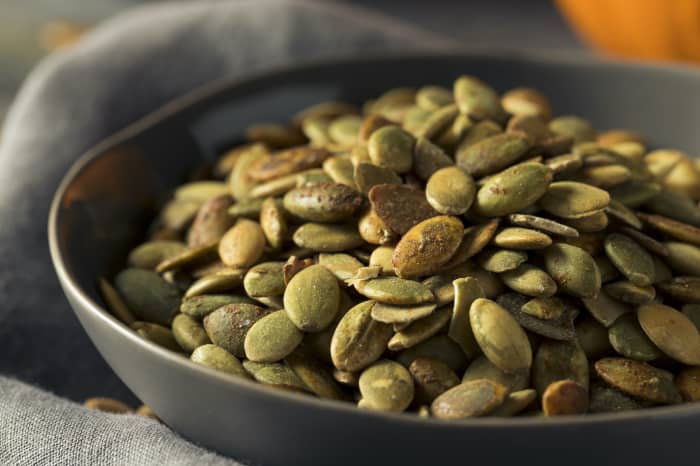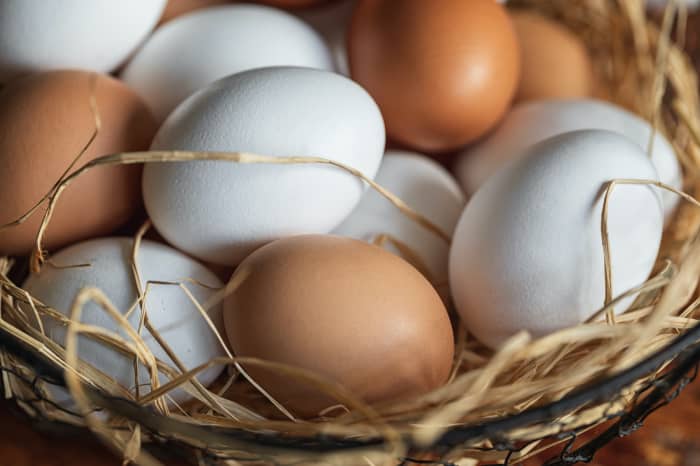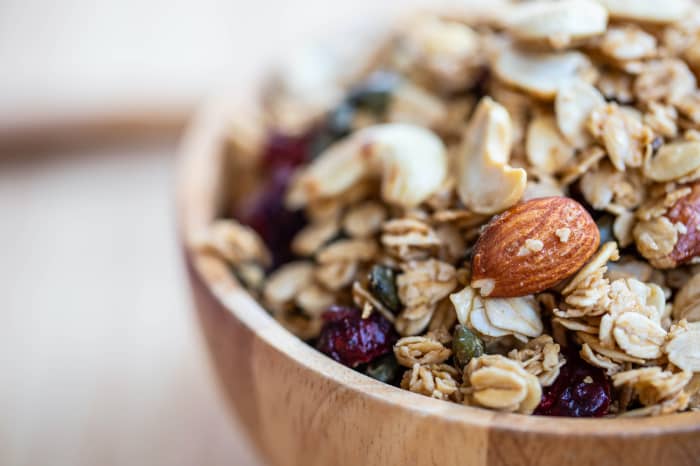This post was originally published on this site
This article is reprinted by permission from NextAvenue.org.
You misplace your keys, can’t recall why you walked into a room, or forget the name of someone you just met. Blame it on your shrinking brain. The brain is packed with highly specialized cells called neurons that help you think, learn and remember, as well as billions of other support cells.
Brain cell loss is a natural part of aging but can result in cognitive decline and memory issues. While many factors influence brain health, a nutritious diet that includes these six nutrients can help slow the effects of time.
Make room for magnesium

Pumpkin seeds are a great source of magnesium.
istock
“The brain’s defense mechanism relies on a just-right dose of magnesium,” according to Annie Fenn, M.D., author of “The Brain Health Kitchen: Preventing Alzheimer’s Through Food.” She says, “Magnesium deficiency has been associated with neurodegenerative disease, such as Alzheimer’s and Parkinson’s.”
A 2023 study of men and women 40 to 73 years old found that more magnesium was linked to a greater brain volume. Though it’s unclear exactly how magnesium contributed to preserving cognition in this study, the mineral is known for deflecting cell damage and inflammation.
Experts suggest women consume 320 milligrams of magnesium daily and that men should get 420 mg. Unfortunately, older adults tend to have lower magnesium intake. To make matters worse, the body absorbs less magnesium and loses more with age.
In addition, certain medications that treat reflux disease and elevated blood pressure can deplete magnesium levels in the body. Ask your doctor if your medications affect your magnesium status.
Related: Having friends isn’t just good for your social life
At 156 mg of magnesium per ounce, pumpkin seeds are among the best magnesium foods. Almonds, spinach, peanut butter, black beans and yogurt are good or excellent sources. Though it’s preferable to get magnesium in your diet, the amount of a regular multivitamin can help bridge small gaps in food intake.
Pump up protein
The body uses the amino acids in food proteins to produce brain cells, neurotransmitters and other compounds that support brain health. For example, one study that followed more than 77,000 men and women for over 20 years found that more protein was associated with less cognitive decline later in life.
Legumes, fish and lean poultry proved superior in protecting brain function, while processed meat products, including hot dogs, were related to poorer cognition. In another 2023 study involving more than 6,900 people without cognitive impairment or dementia at the start, a greater protein intake protected the brain over time.
“Regularly consuming complete proteins — foods with all of the amino acids your body can’t make is a good strategy for your brain,” says Barbie Boules, owner of Barbie Boules Longevity Wellness.
“All animal foods have complete protein and certain plant foods, including soy, quinoa and buckwheat do, too,” Boules adds. Pistachios also offer complete protein.
Protein needs are based on body weight. Generally speaking, three ounces of cooked fish, poultry or lean meat supplies about 20 grams of protein, six ounces of Greek yogurt contains 17 grams, and one whole egg has six grams.
Meeting protein needs can be challenging when you have a small appetite. Further, protein requirements may increase with age. Experts argue that while the suggested protein intake prevents deficiencies, it may underestimate the needs of older adults who don’t process protein as efficiently. Be sure to include lean and low-fat protein foods at every meal.
Plus: Two breakthroughs on dementia — one that’s useful right now
Count on choline

Eggs and other high-protein foods are a good way to get choline.
istock
Choline helps shore up brain cell membranes, most notably neurons. In that regard, choline wards off cell damage. Choline also serves as the raw material for acetylcholine, one of dozens of neurotransmitters, which are compounds that allow neurons to communicate with each other.
One observational study found that in people over 60, consuming between 187 and 400 mg of choline daily from foods and supplements reduced the risk of low cognitive function by about 50% compared with getting less than 188 mg daily. The National Institute of Medicine suggests 550 mg of choline daily for men and 425 mg daily for women.
Choline is concentrated in high-protein foods: one large whole egg contains 147 mg of choline, three ounces of cooked chicken breast has 72 mg, and 1/4 cup of roasted soybeans supply 53 mg. Other plant foods have lesser amounts of choline.
People who avoid animal foods or eat small portions may need more choline. Choline is not found in significant amounts in multivitamins. Consider a separate choline supplement if you aren’t getting enough choline through food.
Also see: Depression diagnosed in early or mid-adulthood linked to dementia: study
Focus on fiber
While most people think of fiber as something to keep the gut moving, Fenn says it also plays a crucial role in keeping your brain healthy.
Research conducted with more than 3,700 men and women 40 to 64 years old who were followed for 20 years found that higher levels of fiber, particularly the soluble kind, were associated with less dementia. The low-risk group in the study consumed 20 grams of fiber on average every day, and those with the most significant risk averaged just eight grams of fiber a day.

Oats and nuts contain soluble fiber, which ultimately can help promote better blood flow to the brain.
istock
Dietary fiber may reduce risk factors associated with cognitive dysfunction, including obesity and elevated blood pressure. “Fiber benefits the brain indirectly by improving metabolic health, specifically blood glucose and lipids,” says Boules.
Fiber is found naturally only in plant foods. Both types of dietary fiber support brain health in different ways. The soluble fiber in foods such as oats, nuts and legumes promotes normal levels of cholesterol and glucose in the blood, which helps protect the integrity of blood vessels and promotes better blood flow to the brain.
Insoluble fiber, predominant in whole grain bread, cereals and brown rice, keeps you fuller for longer and can aid weight control. Many foods contain both types of fiber — the recommended intake is 28 grams daily on a 2,000-calorie diet. Most Americans consume just 15 grams of fiber daily, however. So include at least five servings of fruits and vegetables and three servings of whole grain foods daily to help satisfy fiber needs.
You might like: No more ‘good’ vs. ‘bad’ foods: 10 healthy eating ‘patterns’ to prevent heart disease and death
Fish for the win
According to the American Heart Association, omega-3 fats defend against cell destruction and protect arteries that nourish the brain by discouraging blockages and lowering blood pressure.
Not all omega-3 fats are created equal. Docosahexaenoic acid (D.H.A.) and eicosapentaenoic acid (E.P.A.) are the primary preformed omega-3 fats associated with brain health. Certain plant foods, such as walnuts, flax and chia seeds, contain alpha-linolenic acid, an omega-3 fat that the body can turn into D.H.A. and E.P.A., although the conversion rate is low.
Brain cells are particularly rich in D.H.A. Researchers have observed that higher levels of D.H.A. in the blood delayed the onset of Alzheimer’s disease by nearly five years in people aged 65 and older without dementia.
To meet omega-3 needs, the Dietary Guidelines for Americans recommends eating eight ounces of fish, which is rich in D.H.A. and E.P.A., weekly. If you avoid fish or eat small amounts, you may benefit from a supplement with about 1,000 milligrams of E.P.A. and D.H.A. combined.
Omega-3 supplements can interact with the medication you take, however. “Always check with your medical provider before starting a supplement,” Boules suggests.
Value vitamin B12
Vitamin B12 helps maintain myelin, which coats some parts of neurons and ensures swift and accurate communication. However, researchers believe that myelin shrinks with age, slowing down processing and reducing cognitive function between all aspects of the brain.
“Vitamin B12 deficiency is a known cause of cognitive decline,” Fenn says. “In fact, it’s important to rule out B12 deficiency in anyone with cognitive changes, including early dementia, as it may be reversible.”
An estimated 3% to 43% of older adults in the U.S. have a vitamin B12 deficiency. People with inadequate vitamin B12 intake or regularly taking certain medications for reflux disease or diabetes are at greater risk for low vitamin B12 levels. Aging also limits the body’s ability to absorb natural vitamin B12 because older people produce less stomach acid required to process it.
Vitamin B12 is found naturally only in animal foods. After age 50, rely on synthetic B12, found in dietary supplements and fortified foods, to meet vitamin B12 needs — 2.4 micrograms daily. For example, one serving of fortified cereal can provide 25% of the suggested daily intake. Synthetic B12 is processed without stomach acid, making it available to the body.
Elizabeth M. Ward is a registered dietitian nutritionist (RDN), writer, and award-winning nutrition communicator. Her work has appeared in WebMD, Men’s Health, and EatThis.com. Ward is the author or co-author of eight nutrition, food, and health books. Her most recent book is “The Menopause Diet Plan, A Natural Guide to Hormones, Health, and Happiness” (co-author). She lives in the Boston area.
This article is reprinted by permission from NextAvenue.org, ©2023 Twin Cities Public Television, Inc. All rights reserved.
More from Next Avenue:

